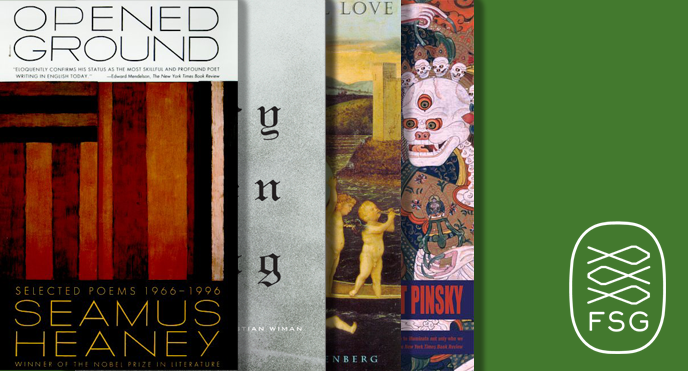Seamus Heaney
In Memoriam M.K.H., 1911-1984
She taught me what her uncle once taught her:
How easily the biggest coal block split
If you got the grain and the hammer angled right.
The sound of that relaxed alluring blow
Its co-opted and obliterated echo,
Taught me to hit, taught me to loosen,
Taught me between the hammer and the block
To face the music. Teach me now to listen,
To strike it rich behind the linear black.
A cobble thrown a hundred years ago
Keeps coming at me, the first stone
Aimed at a great-grandmother’s turncoat brow.
The pony jerks and the riot’s on.
She’s couched low in the trap
Running the gauntlet that first Sunday
Down the brae to Mass at a panicked gallop.
He whips on through the town to cries of ‘Lundy!’
Call her ‘The Convert.’ ‘The Exogamous Bride.’
Anyhow, it is a genre piece
Inherited on my mother’s side
And mine to dispose with now she’s gone.
Instead of silver and Victorian lace
the exonerating, exonerated stone.
Polished linoleum shone there. Brass taps shone.
The china cups were very white and big —
An unchipped set with sugar bowl and jug.
The kettle whistled. Sandwich and tea scone
Were present and correct. In case it run,
The butter must be kept out of the sun.
And don’t be dropping crumbs. Don’t tilt your chair.
Don’t reach. Don’t point. Don’t make noise when you stir.
It is Number 5, New Row, Land of the Dead,
Where grandfather is rising from his place
With spectacles pushed back on a clean bald head
To welcome a bewildered homing daughter
Before she even knocks. ‘What’s this? What’s this?’
And they sit down in the shining room together.
When all the others were away at Mass
I was all hers as we peeled potatoes.
They broke the silence, let fall one by one
Like solder weeping off the soldering iron:
Cold comforts set between us, things to share
Gleaming in a bucket of clean water.
And again let fall. Little pleasant splashes
From each other’s work would bring us to our senses.
So while the parish priest at her bedside
Went hammer and tongs at prayers for the dying
And some were responding and some crying
I remembered her head bent towards my head,
Her breath in mine, our fluent dipping knives —
Never closer the whole rest of our lives.
Fear of affectation made her affect
Inadequacy whenever it came to
Pronouncing words ‘beyond her’. Bertold Brek.
She’d manage something hampered and askew
Every time, as if she might betray
The hampered and inadequate by too
Well-adjusted a vocabulary.
With more challenge than pride, she’d tell me, ‘You
Know all them things.’ So I governed my tongue
In front of her, a genuinely well-
Adjusted adequate betrayal
Of what I knew better. I’d naw and aye
And decently relapse into the wrong
Grammar which kept us allied and at bay.
The cool that came off sheets just off the line
Made me think the damp must still be in them
But when I took my corners of the linen
And pulled against her, first straight down the hem
And then diagonally, then flapped and shook
The fabric like a sail in a cross-wind,
They’d make a dried-out undulating thwack.
So we’d stretch and fold and end up hand to hand
For a split second as if nothing had happened
For nothing had that had not always happened
Beforehand, day by day, just touch and go,
Coming close again by holding back
In moves where I was x and she was o
Inscribed in sheets she’d sewn from ripped-out flour sacks.
In the first flush of the Easter holidays
The ceremonies during Holy Week
Were highpoints of our Sons and Lovers phase.
The midnight fire. The paschal candlestick.
Elbow to elbow, glad to be kneeling next
To each other up there near the front
Of the packed church, we would follow the text
And rubrics for the blessing of the font.
As the hind longs for the streams, so my soul . . .
Dippings. Towellings. The water breathed on.
The water mixed with chrism and oil.
Cruet tinkle. Formal incensation
And the psalmist’s outcry taken up with pride:
Day and night my tears have been my bread.
In the last minutes he said more to her
Almost than in their whole life together.
‘You’ll be in New Row on Monday night
And I’ll come up for you and you’ll be glad
When I walk in the door . . . Isn’t that right?’
His head was bent down to her propped-up head.
She could not hear but we were overjoyed.
He called her good and girl. Then she was dead,
The searching for a pulsebeat was abandoned
And we all knew one thing by being there.
The space we stood around had been emptied
Into us to keep, it penetrated
Clearances that suddenly stood open.
High cries were felled and a pure change happened.
I thought of walking round and round a space
Utterly empty, utterly a source
Where the decked chestnut tree had lost its place
In our front hedge above the wallflowers.
The white chips jumped and jumped and skited high.
I heard the hatchet’s differentiated
Accurate cut, the crack, the sigh
And collapse of what luxuriated
Through the shocked tips and wreckage of it all.
Deep-planted and long gone, my coeval
Chestnut from a jam jar in a hole,
Its heft and hush became a bright nowhere,
A soul ramifying and forever
Silent, beyond silence listened for.
‘Clearances’ is excerpted from Opened Ground.
Chosen for FSG Poetry Month by Katie Kurtzman.
Seamus Heaney (1939-2013) received the Nobel Prize in Literature in 1995. His poems, plays, translations, and essays include Opened Ground, Electric Light, Beowulf, The Spirit Level, District and Circle, and Finders Keepers. Robert Lowell praised Heaney as the “most important Irish poet since Yeats.”
